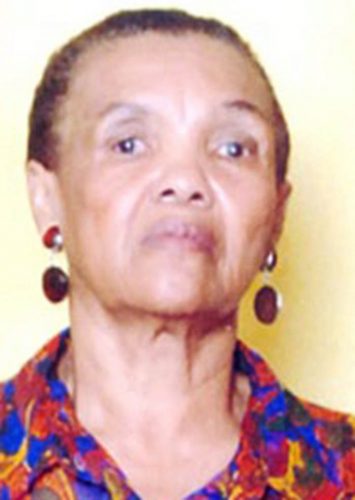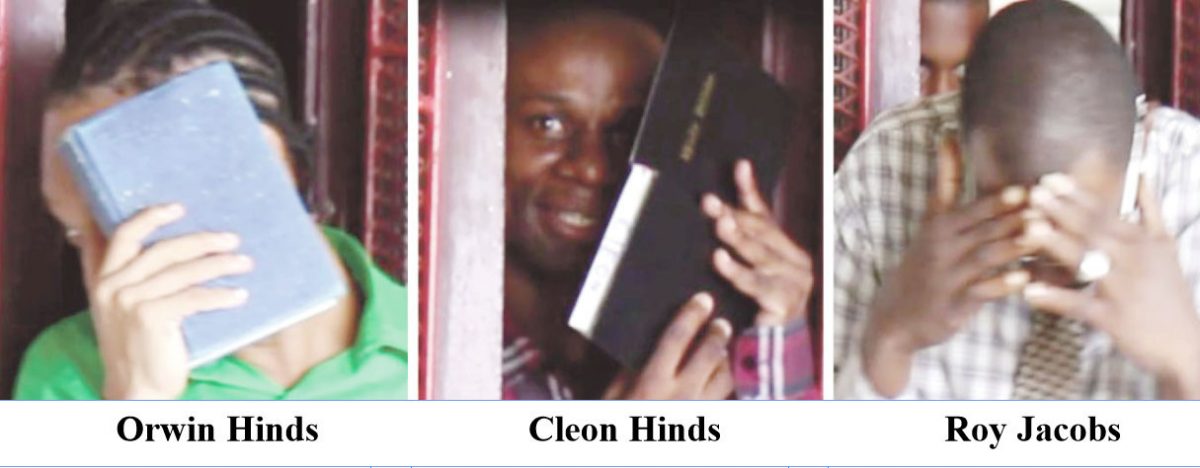The CCJ yesterday set aside the Guyana Court of Appeal’s sentence of 50 years imprisonment for brothers Orwin and Cleon Hinds who in 2015 were convicted of the 2011 murder of Clementine Fiedtkou-Parris and instead imposed the man-datory sentence of life in prison with eligibility for parole after 20 years, inclusive of the time spent on remand.
Delivering the decision, which came months after the Caribbean Court of Justice (CCJ) dismissed an appeal by the brothers against their conviction was Justice Denys Barrow.
“This Court found that a sentencing court has no power to impose a sentence that is intended to be more severe than life imprisonment which is the maximum sentence,” Justice Barrow noted in the ruling.

Fiedtkou-Parris
He said the court found that a sentence of life imprisonment for such a murder is the maximum sentence. Secondly, that it carries with it a statutory entitlement to be considered for eligibility of parole and thirdly that the eligibility arises after a period of 20 years in Guyana or such later period that a court may fix.
Fourthly it was pointed out that a court has no power to impose a sentence of 50 years imprisonment or any determinate period that would exceed the sentence fixed by the Criminal Law Offences Act. In this case, it was stated that setting a minimum period that must be served before there could be eligibility for parole was a mandatory obligation which the Court of Appeal did not fulfill.
The court noted that the murder by the two men fell into the class of the worst murders under Section 101 the Criminal Law Offences Act which are far more violative of the society’s peace and order and they are subject to the special sentencing regime set out in Section 100 A1A of the Act. That section provides that a convicted person shall be sentenced to death or imprisonment for life.
And where a sentence of life is imposed the section states that the court could specify a period which the person should serve before becoming eligible for parole. However, the court pointed out that in the case of the gravest murders the period should be not less than 20 years and in the case of other murders not less than 15 years.
The judge noted that the questions about whether the section creates a mandatory sentence and if it does whether such a sentence is constitutionally compliant were not raised and therefore the court did pronounce on this.
The brothers through their lawyer Arudranauth Gossai argued that the Court of Appeal erred in law by failing to present “the sentence prescribed by Section 100 A(1) a of the Criminal Law Offences Act”.
Counsel’s view was that Alleyne v R established that a sentence of life imprisonment amounted to a term of years of imprisonment and the thinking was that, since life in the context of that case was held to be a term of twenty-five years, the sentencing court ought to have imposed that sentence.
The court, however, stated that it must be remembered that life imprisonment means being imprisoned for life and the convicted person has no right to be released. The fact that the parole system can result in a convicted person being released and not dying in prison did not alter that duration of life in prison.
And the other dimension of Gossai’s arguments was that a sentence of 50 years was in fact a more severe sentence than the maximum term of imprisonment for life.
And elaborating on the Court’s October 2022 decision to set aside the brothers’ appeal of their conviction, Justice Barrow said that the court noted that the convictions of the brothers were primarily based on their written and oral confessions and in relations to Orwin on the evidence of an eyewitness who identified him on an identification parade.
In his statement Orwin described the plan that was hatched with his brother and two other men known as ‘Dutchie’ and ‘Black Boy’ to kill the woman for a sum of money. He said he obtained a gun and gave it to Cleon who then lent it to ‘Black Boy’. He and the other men then went along with a driver to the woman’s house and before the killing he indicated he wanted no part of the crime but was persuaded to join in.
According to the statement, as read out by Justice Barrow, Orwin said he and ‘Dutchie’ entered the house where they passed a man on the stairs who he was told to restrain. He later heard two shots and they left and heard the following day that the woman had died. Later that day he said `Black Boy’ gave him $80,000 and his brother $5,000.
On the other hand Cleon in his statement confessed to being told about the payment to murder the woman and his decision to lend his gun to the organisers to “get in on the business”. He also said he drove around the house after the murder and that he collected money for the killing.
According to Justice Barrow the court found that there was nothing in the arguments of the brothers that could undermine the probative value and weight of their confessions. While their lawyer advanced the argument that Orwin was beaten to give his statement and as such it was untrue, the court found that it was virtually impossible to overcome a jury’s decision as to who or what to believe unless it could be shown that their decision was perverse.
“In the present the reasonableness of the jury’s decision to doubt the appellant’s allegation could not be doubted,” Justice Barrow said.
In the case of Cleon the lawyer submitted that the trial judge ought to have warned the jury of the danger of relying on the statement since there was no other confirmatory evidence.
But the court found that in the case’s circumstances there was no requirement of law to deliver such a warning.
The CCJ judge said while there were other arguments raised on this aspect of the case those were of little substance and did not warrant the court’s consideration.
In February of last year, the Guyana Court of Appeal also upheld the convictions, but reduced the 81-year sentence which trial judge Navindra Singh had imposed on the Hinds brothers and their co-convicts Roy Jacobs and Kevin October who had all been hired to kill the woman.
The Hinds brothers, Jacobs and October— who succumbed to COVID-19 last year, were all found guilty by a jury of murdering Fiedtkou-Parris on June 30th, 2011, as part of a conspiracy for money.
The charge against the quartet stated that they murdered the elderly woman, pursuant to an arrangement whereby money was intended to pass from one person to another.
They stormed into the septuagenarian’s Lot 42 Robb Street home after enquiring for her and thereafter shot and killed her just as she exited her bedroom.
The men then jumped into a waiting car while the injured woman was rushed to the Georgetown Hospi-tal, where she was pronounced dead shortly after.
The reputed mastermind of the hit was never charged.






